The Words That Mattered in 2012
My review and analysis of the most memorable and meaningful quotations from the year almost-past was published by the History News Network on December 17.
“It’s halftime in America” – Clint Eastwood
Over six months before Eastwood made headlines by rambling at an empty chair in prime time at the Republican Convention, the actor/director was at the center of controversy for his message in a two-minute Super Bowl commercial for Chrysler. The ad, which lauded the resilience and high quality of American auto manufacturing, was a Rorschach test for Americans. President Obama’s supporters loved its implied equation that the auto industry was on its deathbed, the President made the tough decision to help it out, and now it was more than back on its feet. Obama’s detractors feared the same equation.
“The fact is, I’m gay…” – Anderson Cooper
The most remarkable aspect of the coming-out of one of America’s most popular news anchors was how unremarkable it was. Coming just one year after the dismantling of the military’s “Don’t Ask, Don’t Tell” policy and months before voters in Maine, Maryland, and Washington approved marriage for same-sex couples while voters in Minnesota rejected a ban on same-sex marriages, Cooper’s words reflected the continuing sea change in American views of homosexuals in society.
“… it is not our role to forbid it, or to pass upon its wisdom or fairness.” – John Roberts
Many close observers of the Supreme Court expected a 5-4 decision in its ruling on the constitutionality of President Obama’s signature health care legislation, the Affordable Care Act. Most believed it would be struck down and almost no one thought the decisive fifth vote upholding the law would come from consistently conservative, President George W. Bush appointee, Chief Justice John Roberts. For Roberts—only seven years into his tenure as Chief Justice and a relatively young 57 years of age—it was just one of what will likely be many key quotes to have a profound impact on American life.
“… 47 percent of the people…”– Mitt Romney
The Republican nominee for the presidency said several things that made his supporters cringe, including “I like being able to fire people,” “self-deportation,” and “I’m not concerned about the very poor.” But no quote damaged Romney’s prospects more than his secretly-recorded remarks at a closed fundraiser in which he said nearly half of American voters thought of themselves as “victims” whom he would be unable to convince should “take personal responsibility and care for their lives.”
“… you didn’t build that.” – Barack Obama
President Obama’s attempt to explain how small businesses are built through the efforts of many individuals along the way with the support of public institutions was awkward at best and arrogant at worst. It became the Republicans’ favorite line of attack in their portrayal of Obama as a booster of big-government and opponent of self-sufficiency.
“Osama bin Laden is dead and General Motors is alive!” – Joe Biden
The Obama campaign trotted out the generic and forgettable “Forward” as its campaign motto, but this succinct, powerful, and frequently repeated statement was far better and more meaningful. Biden added to an impressive year for a guy with a reputation as a gaffe machine with his largely praised debate performance, which was critically important for Obama’s reelection in the wake of the President’s limp first debate.
“…legitimate rape…” – Todd Akin
The GOP’s nominee for Senate gave away what appeared to be a sure win when he added this term to the American lexicon. Explaining why raped women did not need to consider abortion, Akin dug deeper by adding, “the female body has ways to try to shut that whole thing down.” A few months later, Indiana Senate candidate Richard Mourdock similarly blew a comfortable lead, defending his strongly pro-life position by noting that pregnancies that resulted from rape were, “something that God intended to happen.”
“I love you, women!” – Ann Romney
Not since President George H.W. Bush said, “Message: I care” in 1992 has there been a more transparent attempt to convey empathy and concern in a presidential campaign as this one from the woman who hoped to become America’s new First Lady. But despite her anecdotes of eating tuna fish sandwiches with Mitt as a young married couple and just-us-gals appeal, Mrs. Romney was unable to keep her husband from suffering a near-landslide 55-44% loss among female voters.
“I have no idea, nor am I the least bit concerned or interested.” – Chris Christie
After Superstorm Sandy pounded much of New Jersey, that state’s governor—early Romney supporter and Republican Convention keynote speaker Chris Christie—was ripped for praising President Obama’s support in coordinating the federal relief effort. Focused on working to help the people of the state he was elected to serve, Christie stayed true to his reputation as a straight-talker with these words, directed at a Fox News host who asked him if he knew whether Mitt Romney had plans to visit the devastation.
“The vibrations are right.” – Peggy Noonan
Two days before the election, Noonan—a captain of the American political punditocracy and former presidential speechwriter—demonstrated the perils of existing within an invented political reality. Citing enthusiasm at rallies and ubiquity of lawn signs in pointing to a Romney victory, she dismissed and subtly mocked the work of leading political statisticians, most famously Nate Silver, who aggregated polling data to predict the election’s outcome with stunningly precise accuracy. Like others in 2012, she learned that, as with words, facts matter.
“Justice has been done.” -Barack Obama, May 1, 2011
 One year ago this evening, I went into my bedroom and turned on the television. I was probably planning to watch some baseball highlights, but the tv was on CNN and before I could change the channel, my attention was seized by the news crawl and discussion that President Obama had an announcement coming up from the White House.
One year ago this evening, I went into my bedroom and turned on the television. I was probably planning to watch some baseball highlights, but the tv was on CNN and before I could change the channel, my attention was seized by the news crawl and discussion that President Obama had an announcement coming up from the White House.
I don’t exactly recall what my initial reaction to that news was, though I do remember that it did make me a bit nervous. Those first thoughts didn’t center on the possibility that American forces had captured or killed Osama bin Laden, but very quickly that was being discussed by those on television. Quickly too, came leaks that the announcement would be what I and millions of others had hoped and dreamed for since September 11, 2001–that Osama bin Laden had been killed. I told my wife and called my brother and my parents, who hadn’t heard the news yet, and I then watched with a pride tempered by sobriety as President Obama announced that a raid by Navy SEALS had found bin Laden and that he was now dead.
My six-year-old daughter–who celebrated her seventh birthday the next day–was asleep and she knew little if anything about bin Laden, so I didn’t go upstairs to her room. But I did enter my sons’ darkened room to share history. My then-11-year old was not even a year-and-a-half old on 9-11-2001. I was pushing him in his stroller on a remarkably gorgeous Tuesday morning when I heard on my Walkman that airplanes had crashed into the Twin Towers in New York City. Concerned, but still not able to imagine how destructive that day would be, I walked home with him and then spent the next twelve hours watching the horror of the attacks and their disorienting aftermath. Both he and my younger son–who was conceived less than a week after 9-11–knew well the events of that day and they were excited that not only had this bad person been punished, but that their dad shared the breaking news with them.
An hour or so later I posted my thoughts for this site. Also entitled, “Justice has been done”, I wrote,
Sixty-six years and one day after the death of Adolf Hitler, we elatedly welcome the killing of another of history’s most detestable villains–Osama bin Laden–by U.S. military special forces.
The cancer was in Pakistan. And exactly eight years after the phrase grasped its place in the American consciousness; truly, finally, Mission Accomplished.
Now one year after bin Laden’s death, America commemorates the anniversary, though it has not dominated or even led the news. Because this is an presidential election year, much of the attention given to it revolves around how it plays politically. Specifically, there have been many examinations of a recent campaign video from President Obama that focuses on the raid and explains how it is evidence for his successful leadership. Critiques of the video from Republicans probe new depths of transparent hypocrisy. Time’s Jon Meacham correctly notes:
Republicans are — forgive the cliché — shocked, shocked to discover that a presidential contender is “politicizing” an important national event. In this sense, “politicizing” might be best translated as “beating us up and we don’t have anything much to say to stop it.” The ad itself raises intriguing, substantive, legitimate questions — and the ferocious, sputtering Republican reaction is proof positive that they know it, or at least suspect it.
The ad’s theme is that Obama made a courageous and risky decision to send in the SEALs. Here the President has history and facts on his side: it was a courageous and risky call. Had the mission failed, had it been another Desert One, the very people now criticizing the President for trumpeting the achievement would be beginning their second year of excoriating Obama for weakness and fecklessness. And anyone weighing whether to re-elect the President should take the bin Laden operation into account: it is a powerful exhibit that Obama is a steely Commander in Chief — a critical test for many Americans.
Michael Tomasky of The Daily Beast and Newsweek adds:
It couldn’t be more hilarious, watching these Republicans rend their garments over the Obama administration’s bin Laden video. Imaging the paroxysms we’d have been forced to endure if George W. Bush had iced the dreaded one is all we need to do to understand how hypocritical it all is. But what obviously gets under Republicans’ skin is not the fact of this video’s existence, but the fact that Barack Obama got him and they didn’t, which destroys their assumption of the past decade that they are “the 9/11 party.” And more than that—and this is the real story here—it’s the fact that the Democrats don’t appear to be afraid of the Republicans anymore. That, to Republicans, is what’s truly unacceptable.
One does not need to be a supporter of President Obama to admit that the pursuit and killing of bin Laden was a great personal success for his presidency. It was an enormous risk that not all–or even most–presidents would have taken. The video does not exploit that, it acknowledges it and places the event in the proper context of the choice in the 2012 election.
The President’s greatest responsibility is not to “manage the economy” or the myriad other tasks for which they receive too much credit or too much blame. It is to make extraordinarily difficult decisions at moments of intense uncertainty to protect the country. Obama made such a decision a year ago by going into Pakistan to take out bin Laden. Not one of the people in office (George W. Bush) or closest to becoming President in 2008 (John McCain, Mitt Romney, Hillary Clinton) supported such a policy. McCain especially mocked Obama’s naivete and foolishness. But they were wrong, and Obama was right. And America and the world are better places because of that.
“…an iron curtain has descended across the Continent.” – Winston Churchill, March 5, 1946
The following post was originally published on March 5, 2010. It is reposted today to commemorate the 66th anniversary of Winston Churchill’s “Iron Curtain” Speech.
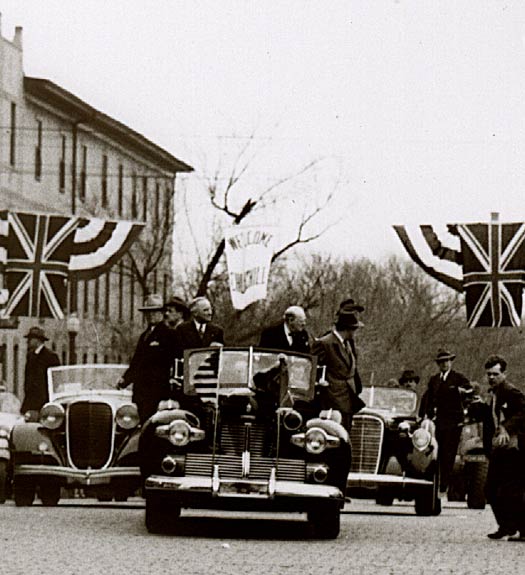 Winston Churchill had an unique and lifelong connection to the United States. His fascinating mother was born Jennie Jerome in Brooklyn and was one of many American heiresses in the late 19th century who traveled across the Atlantic before marrying into European aristocracy. As British prime minister in the years before American entry into World War II, Churchill cultivated a strong bond of affection and necessity with President Franklin Roosevelt, with whom he forged the “special relationship” that is still often referred to by modern leaders of these two great nations. Churchill’s exceptional bond to America was recognized in 1963, when President John Kennedy signed a congressional proclamation that conferred honorary U.S. citizenship on Churchill, making him just the second person–following Revolutionary War hero Marquis de Lafayette–to earn such distinction.
Winston Churchill had an unique and lifelong connection to the United States. His fascinating mother was born Jennie Jerome in Brooklyn and was one of many American heiresses in the late 19th century who traveled across the Atlantic before marrying into European aristocracy. As British prime minister in the years before American entry into World War II, Churchill cultivated a strong bond of affection and necessity with President Franklin Roosevelt, with whom he forged the “special relationship” that is still often referred to by modern leaders of these two great nations. Churchill’s exceptional bond to America was recognized in 1963, when President John Kennedy signed a congressional proclamation that conferred honorary U.S. citizenship on Churchill, making him just the second person–following Revolutionary War hero Marquis de Lafayette–to earn such distinction.
Yet Churchill’s most enduring link to the United States may be an address he delivered 64 years ago today at Westminster College in Fulton, Missouri. It was immediately and remains known as the the “Iron Curtain” Speech.
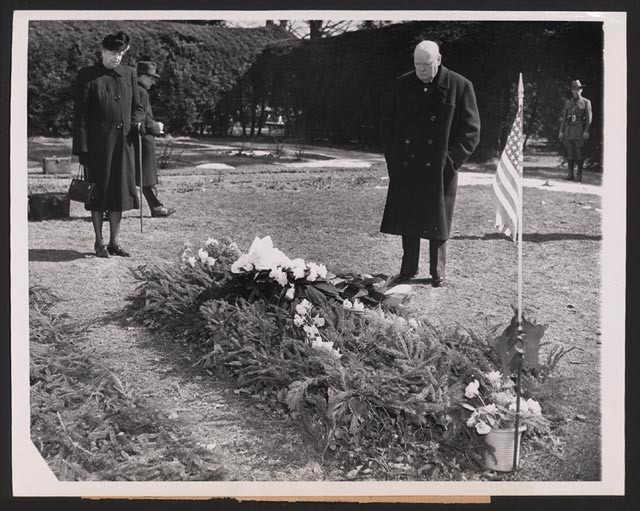 Churchill traveled to the United States in January of 1946, less than six months after British voters–appreciative and admiring of his wartime leadership but weary of battle and focused on economic concerns–ousted his Conservative Party from power in British parliamentary elections, resulting in his resignation as prime minister of Great Britain (he remained the Conservative leader and returned as prime minister from 1951-55.) During his two-month stay in the U.S., Churchill addressed the Virginia General Assembly, met with General Dwight Eisenhower, and visited the grave of his close friend and colleague, Franklin Roosevelt, who had died less than a year earlier. During this visit, Churchill famously noted of FDR, “Meeting Roosevelt was like uncorking your first bottle of champagne.”
Churchill traveled to the United States in January of 1946, less than six months after British voters–appreciative and admiring of his wartime leadership but weary of battle and focused on economic concerns–ousted his Conservative Party from power in British parliamentary elections, resulting in his resignation as prime minister of Great Britain (he remained the Conservative leader and returned as prime minister from 1951-55.) During his two-month stay in the U.S., Churchill addressed the Virginia General Assembly, met with General Dwight Eisenhower, and visited the grave of his close friend and colleague, Franklin Roosevelt, who had died less than a year earlier. During this visit, Churchill famously noted of FDR, “Meeting Roosevelt was like uncorking your first bottle of champagne.”
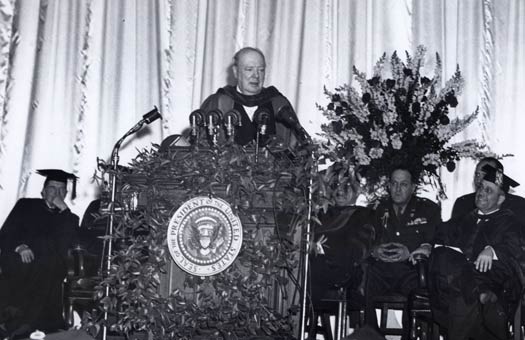 The Iron Curtain Speech (video and text) was described in a 2006 American Heritage article by writer and editor Christine Gibson as, “a quintessential Churchill speech, one that was bold, expertly written, and prophetic.” As he had about ten years earlier, Churchill accurately warned of a growing European menace; this time from aggression of communist Soviet Union, a nation whose sacrifice and alliance had so recently proven critical in defeating the scourge of Nazi Germany.
The Iron Curtain Speech (video and text) was described in a 2006 American Heritage article by writer and editor Christine Gibson as, “a quintessential Churchill speech, one that was bold, expertly written, and prophetic.” As he had about ten years earlier, Churchill accurately warned of a growing European menace; this time from aggression of communist Soviet Union, a nation whose sacrifice and alliance had so recently proven critical in defeating the scourge of Nazi Germany.
In the speech, Churchill referenced his admiration and appreciation for the Soviets while simultaneously sending a clarion call for Anglo-American unity and steadfastness in negotiating with and confronting them. He also provided the world with the term that would endure as the vivid metaphor for communist totalitarianism for the nearly half century struggle of the Cold War:
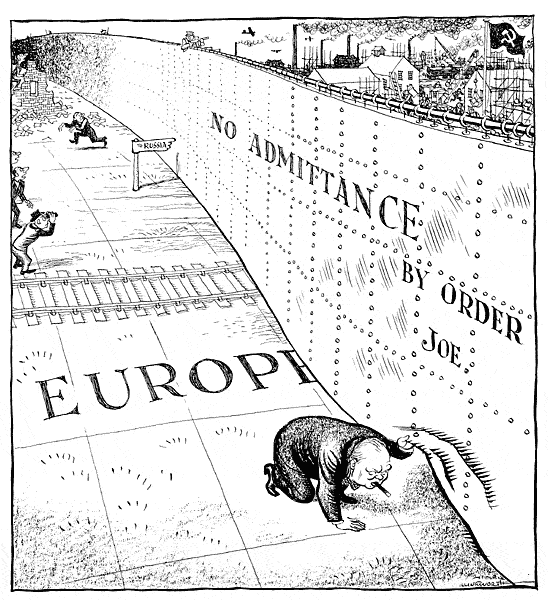 I have a strong admiration and regard for the valiant Russian people and for my wartime comrade, Marshal Stalin. There is deep sympathy and goodwill in Britain — and I doubt not here also — toward the peoples of all the Russias and a resolve to persevere through many differences and rebuffs in establishing lasting friendships.
I have a strong admiration and regard for the valiant Russian people and for my wartime comrade, Marshal Stalin. There is deep sympathy and goodwill in Britain — and I doubt not here also — toward the peoples of all the Russias and a resolve to persevere through many differences and rebuffs in establishing lasting friendships.
It is my duty, however, to place before you certain facts about the present position in Europe.
From Stettin in the Baltic to Trieste in the Adriatic an iron curtain has descended across the Continent. Behind that line lie all the capitals of the ancient states of Central and Eastern Europe. Warsaw, Berlin, Prague, Vienna, Budapest, Belgrade, Bucharest and Sofia; all these famous cities and the populations around them lie in what I must call the Soviet sphere, and all are subject, in one form or another, not only to Soviet influence but to a very high and in some cases increasing measure of control from Moscow…
Churchill proceeded to issue a typically articulate and clear-minded assessment of the threat posed by the Soviets as well as a stern, historically-based warning of the perils that would arise if the threat was ignored.
 I do not believe that Soviet Russia desires war. What they desire is the fruits of war and the indefinite expansion of their power and doctrines.
I do not believe that Soviet Russia desires war. What they desire is the fruits of war and the indefinite expansion of their power and doctrines.
But what we have to consider here today while time remains, is the permanent prevention of war and the establishment of conditions of freedom and democracy as rapidly as possible in all countries. Our difficulties and dangers will not be removed by closing our eyes to them. They will not be removed by mere waiting to see what happens; nor will they be removed by a policy of appeasement.
What is needed is a settlement, and the longer this is delayed, the more difficult it will be and the greater our dangers will become.
From what I have seen of our Russian friends and allies during the war, I am convinced that there is nothing they admire so much as strength, and there is nothing for which they have less respect than for weakness, especially military weakness.
Churchill’s speech was met with broad approval within the United States and Great Britain. Unsurprisingly the Soviets, including premeir Josef Stalin who termed it “war mongering”, were not as supportive. Regardless of one’s opinion, Churchill’s speech–like many others delivered by one of the greatest orators in modern history–met its intended effect. The term “iron curtain” provided people around the world with a sharp, memorable, and succinct yet thorough description of a new danger in Europe.
Ousted from office and thousands of miles away from home, Churchill and his words had again inspired and mobilized vigilance, courage, and action from his audience, which would even decades after his death in 1965, come to include countless millions throughout Europe and his beloved United States.
(Photos from top: Churchill and President Truman are welcomed in Missouri; Churchill and Eleanor Roosevelt visit FDR’s grave; Churchill delivers Iron Curtain Speech; British cartoon from 1946 showing Churchill exposing Iron Curtain; British cartoon from 1980 depicting Poland emerging from under Iron Curtain.)
Various and Sundry – March 2, 2012
* 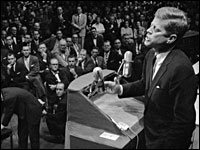 On Sunday, Rick Santorum told ABC News that John Kennedy’s September 12, 1960 speech to Greater Houston Ministerial Association made him want to “throw up.” Kennedy’s address to an assembly of Protestant ministers has typically been praised by Republicans and Democrats for its directness in confronting the false and damaging charges about how Kennedy–who would become the first Catholic U.S. president–would favor the Church and take orders from the Pope.
On Sunday, Rick Santorum told ABC News that John Kennedy’s September 12, 1960 speech to Greater Houston Ministerial Association made him want to “throw up.” Kennedy’s address to an assembly of Protestant ministers has typically been praised by Republicans and Democrats for its directness in confronting the false and damaging charges about how Kennedy–who would become the first Catholic U.S. president–would favor the Church and take orders from the Pope.
Santorum said that what caused his stomach to turn was Kennedy’s assertion that “people of faith [should] have no role in the public square.” Check the transcript and video to try to find where that was stated or even implied. What I suspect bothers Santorum most is the following excerpt:
“I believe in an America where the separation of church and state is absolute, where no Catholic prelate would tell the president (should he be Catholic) how to act, and no Protestant minister would tell his parishioners for whom to vote; where no church or church school is granted any public funds or political preference; and where no man is denied public office merely because his religion differs from the president who might appoint him or the people who might elect him.
I believe in an America that is officially neither Catholic, Protestant nor Jewish; where no public official either requests or accepts instructions on public policy from the Pope, the National Council of Churches or any other ecclesiastical source; where no religious body seeks to impose its will directly or indirectly upon the general populace or the public acts of its officials…”
* 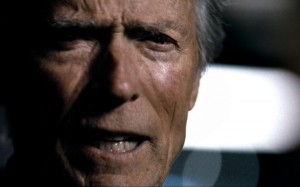 Despite the anticipation and excitement that accompanies them every year, Super Bowl ads are typically (and justifiably) quickly forgotten. But this year’s “Halftime in America” commercial for Chrysler was an immediate focus of attention and continues to be discussed, mainly for what have been perceived as its political undertones.
Despite the anticipation and excitement that accompanies them every year, Super Bowl ads are typically (and justifiably) quickly forgotten. But this year’s “Halftime in America” commercial for Chrysler was an immediate focus of attention and continues to be discussed, mainly for what have been perceived as its political undertones.
Running for two minutes and appearing just prior to the second half kickoff, the ad featured Clint Eastwood in the continuation of the campaign that lauds the resilience of the city of Detroit and the high quality of American automaking. Eastwood closes the piece by grunting, “This country can’t be knocked out with one punch. We get right back up again, and when we do the world is going to hear the roar of our engines…It’s halftime, America. And our second half is about to begin.”
The ad has been a Rorschach test for Americans. Those who support President Obama think it was great. In their equation, the auto industry was on its deathbed, Obama made the tough decision to help it out, and now it is more than back on its feet. Those who oppose Obama–in this case, most prominently Karl Rove–fear the same equation and view the piece as a kind of Obama campaign spot (never mind that Eastwood is a Republican and publicly opposed the government rescue of Chrysler and General Motors.)
*  Mitt Romney has been a treasure trove quotable gems recently. My clearinghouse of Romney’s words can be found at www.mittquotes.com. Most of The Week’s “Mitt Romney’s 9 Worst Clueless Rich Man Gaffes” are already featured at mittquotes. Inspired by Romney, Slate’s Dave Weigel has coined the term “Romneying”, which he defines as, “accidentally bragging about your place high up in the economic stratosphere.”
Mitt Romney has been a treasure trove quotable gems recently. My clearinghouse of Romney’s words can be found at www.mittquotes.com. Most of The Week’s “Mitt Romney’s 9 Worst Clueless Rich Man Gaffes” are already featured at mittquotes. Inspired by Romney, Slate’s Dave Weigel has coined the term “Romneying”, which he defines as, “accidentally bragging about your place high up in the economic stratosphere.”
“What a snob!” – Rick Santorum, February 25, 2012
Polls in Michigan a day before that state’s Republican primary show Mitt Romney and Rick Santorum in a very tight race. Both men have been intensely battling for a win in Michigan. For Romney, Michigan’s primary is an opportunity to regain what he hopes will be the clear and closing path to the nomination. A win in Michigan is also crucial to Romney in order to avoid an embarrassing defeat in the state of his birth and youth, which is frequently–though misguidingly–described as his “home state.” For Santorum, Michigan represents a chance to seize on the momentum
that began with his victories in Minnesota and Colorado.
On Saturday Santorum was speaking to an audience in the Detroit suburb of Troy, when he cathartically unloaded on President Obama. “President Obama wants everybody in America to go to college. What a snob! There are good, decent men and women who work hard every day and put their skills to the test that aren’t taught by some liberal college professor.” Santorum soon added, “That’s why he wants you to go to college. He wants to remake you in his image.”
Santorum has been widely criticized for the comments, particularly for his sharp and insulting use of the word, “snob” and the notion that encouraging people to attend college makes one a snob. However, all the criticism I’ve seen and read have come from the kinds of people who would not be voting for Santroum on Saturday anyway; reporters and commentators who view genuine candor as a gaffe, Obama supporters, and those prominent figures who back Romney in astoundingly greater figures than those who have endorsed Santorum.
What struck me was the reaction in the room–stirring laughter, heads nodding in enthusiastic approval, and an energy drawing power from barely submerged hostility. Santorum was channeling the anger and resentment that has served as the oxygen for much of the GOP for years, particularly since President Obama was elected. Santorum can convey this anger and resentment far better than Romney can, because it seems he really feels it and means it. And I wouldn’t be surprised if tomorrow night, we learn that so too do a plurality of Republicans in Michigan.
“Do you believe in miracles? Yes!” – Al Michaels, February 22, 1980
Thirty-two years ago today. The greatest upset in the history of American sports. USA 4 USSR 3.
“Let Detroit Go Bankrupt.” – Mitt Romney, November 18, 2008
The following post was published in the Perspectives Section of the Chicago Tribune on Sunday February 19.
On Tuesday, Mitt Romney added his voice to the chorus of political writers, observers, and commentators who describe Michigan as his “home state.” Romney opened his op-ed in the Detroit News with the trying-way-too-hard lines, “I am a son of Detroit…I grew up drinking Vernors and watching ballgames at Michigan and Trumbull. Cars got in my bones early. And not just any cars, American cars.”
Let’s set aside how Vernors (a local ginger ale) is overrated and that real Detroit Tigers fans always say that they used to watch games at the old Tiger Stadium’s address at the corner of Michigan and Trumbull. What’s most important is that Mitt Romney is asserting that Michigan is his home turf and he is betting that his past in the state will help him in the crucial February 28 Michigan Primary. But Michigan is not Romney’s home turf and his claiming it as such is not a good idea.
Technically, Romney is a Michigander—he was born in Detroit in 1947 and he was raised in the tony suburb of Bloomfield Hills. But after Romney graduated from high school in 1965 he never lived in the state again.
If Romney has a true home state, it is Massachusetts, where he attended business and law school at Harvard, raised his family in the Boston suburb of Belmont, and served as governor of the state from 2003-2007. Romney also has much stronger ties to heavily-Mormon Utah, where he attended Brigham Young University and where he returned to serve as the executive director of the 2002 Winter Olympics in Salt Lake City.
Yet this notion that Michigan is Romney’s home state persists. Some of this belief is because his father George was governor of Michigan from 1963-1969. But those who argue that Mitt Romney will benefit from being the son of a former, very popular governor of Michigan are ignoring an important fact: there are very few people alive in Michigan who actually remember—let alone voted for—George Romney.
In order to have voted for George Romney, whose last campaign for governor took place in 1966, a Michigander would have to have been born by 1945. Lifelong residents who are in their late 60s are not a huge part of Michigan’s GOP primary electorate. And even if they were, if those folks admired George Romney’s liberal brand of Republicanism (ex. supporting civil rights legislation, critiquing American involvement in the Vietnam War, advocating for expansion of government social programs) they may have already fled today’s more rigidly right-wing GOP.
The sad reality for Romney is that Michigan is really just another state. Even more unfortunate for Romney, many do not view it that way. Instead, they see Michigan as a state to which Romney still has a living and politically advantageous connection. The more this false perception is held, the higher the expectations will be that Romney will win the state decisively. These heightened expectations can only serve to harm Romney if he loses in Michigan. Losing in Colorado was a surprise, but falling in his home state? That will invigorate the Anyone-but-Mitts (particularly Rick Santorum) and likely dominate the post-election commentary as well as the thoughts of Republican voters in other states heading to Super Tuesday.
Then, of course, there’s the matter of the four words that may burden Romney in the primary and, if he manages to win the Republican nomination, will certainly weigh him down in Michigan in the general election: “Let Detroit Go Bankrupt.”
These were the words used in the headline of Romney’s op-ed piece published by the New York Times on November 18. 2008. Though it’s typically the case that someone other than an article’s author is responsible for its title, the content of Romney’s argument—that the desperately floundering automotive giants Chrysler and General Motors should not receive $85 billion in federal loans to survive—does not alter the meaning of it.
Romney can attempt to wiggle out of this as much as he likes, and his recent article suggests that he will try. But time has not been kind to his “Let Detroit Go Bankrupt” argument. Chrysler and General Motors are enjoying record sales and they have already paid back almost all of the money. The success of the auto company rescue is widely credited with saving countless jobs in the auto industry and preventing a job-destroying ripple effect that would have traumatized Michigan and much of the United States. This makes Romney’s 2008 article appear foolish and it makes his latest published attempt to rationalize the piece appear callous.
Romney’s Detroit News op-ed wasn’t his only media splash in Michigan on Tuesday. His campaign also debuted a new television ad. Entitled, “Growing Up”, it features Romney driving around a Michigan neighborhood, as he briefly reminisces on his past in the state before decrying the impact of unions, liberals, and President Obama. It includes footage of people exiting a factory that looks as if it came from a colorized newsreel of several generations past. As it ends, attractive photos of Mitt are shown; as a boy flashing an eager smile while sitting in a cool 50s-era car and as a young man posing in a living room with his future-wife Ann.
The ad clearly is meant to convey that Romney has roots in the state. But its retro feel unintentionally emphasizes that his only meaningful connection to Michigan are those roots. What remains is the strong impression that Romney is from Michigan, but not of Michigan, or for Michigan. His narration concludes, “Michigan’s been my home, and this is personal.” But Romney’s tone is rushed, his sentiment is inauthentic, and his words are unconvincing.
“…bin Laden is dead and General Motors is alive.” – Joe Biden, January 31, 2012
It took over three years, but Vice President Joe Biden has finally said something meaningful and memorable that doesn’t feature the word, ‘fucking’.
S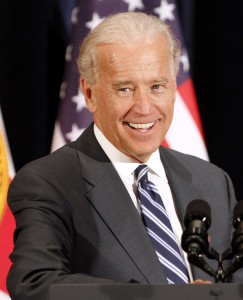 peaking to a private gathering of fundraising donors in Fort Worth, Texas last Tuesday, Biden took 92 words to sum up a nine-word Obama reelection message: “…bin Laden is dead and General Motors is alive.”
peaking to a private gathering of fundraising donors in Fort Worth, Texas last Tuesday, Biden took 92 words to sum up a nine-word Obama reelection message: “…bin Laden is dead and General Motors is alive.”
The Full Biden follows:
“So folks, the best way to sum up I think where we are today — when I was asked the other day, someone gave me this line. The best way to sum up the job that President Obama has done — and by the way, he committed we’d be out of Iraq. We are out of Iraq, completely out of Iraq. But the best way to sum up the job the President has done if you need a real shorthand: Osama bin Laden is dead and General Motors is alive.”
“Conservatism is alive and well…” – Rick Santorum, February 7, 2012
Republican presidential candidate Rick Santorum scored two impressive victories over Mitt Romney last night; a pounding of the GOP frontrunner in Minnesota and a surprising and solid victory over him in Colorado.
Santorum still faces a steep climb to the nomination. The Republican Establishment–or what has been the Republican Establishment–has overwhelmingly lined up behind Romney, who has widely been viewed as possessing the best chance from among the Republican field of beating President Obama in November. Romney also has big bucks; hundreds of millions of his own as well as a huge advantage over Santorum in individual and corporate donations.
But Santroum’s victories last night remind the American political public what this blog and many others have been noting for months–namely, that Republicans don’t really like Mitt Romney. Even in the contests he has won, voter participation and enthusiasm for him has been weak. Romney’s biggest win so far, a strong plurality in Florida, included only 51% his supporters expressing satisfaction with the Republican candidates.
There are many valid reasons for these Republicans to dislike Romney. But perhaps the most salient reason for them is that they don’t truly believe that he is a “conservative.” At least not a conservative in the way that term has been redefined in recent years. That’s why–for all of his significant weaknesses as a candidate–Rick Santorum was wise to begin his victory speech last night with the words, “Conservatism is alive and well…”
In just less than three weeks, Republican primary voters in the critically-important, potential swing states of Michigan and Arizona will go to the polls. During the time leading to these primaries, Santorum and his message that conservatism is vital and resides more in him than any other candidate will be put to the test. If he is successful, Santorum will strike a shocking blow in this unpredictable nominating season. He will also serve as evidence that what had been considered mainstream, modern, American conservatism now has a very different meaning than it ever has.
“We wish you love, peace, and soul.” – Don Cornelius, “Soul Train”, 1971-93
Don Cornelius, the creator and conductor of the “hippest ride in America”–the groundbreaking television show, “Soul Train”–committed suicide yesterday in his home in suburban Los Angeles. He was 75 years old.
Cornelius was born on September 27, 1936 in Chicago. He grew up on the south side of the city and joined the Marines after graduating from high school. While working as an officer in the Chicago Police Department in 1966, Cornelius was encouraged by a local radio personality to apply his beautifully smooth baritone voice towards a career in radio broadcasting. Cornelius took a radio course, recorded a demo tape, and quickly landed a job with Chicago radio station WVON as a deejay.
He developed the pilot for “Soul Train” with $400 of his own money and based it on the popular “American Bandstand”, but with an emphasis on black music, style, and dance. After one year as a local show in Chicago, it was picked up for national syndication and its base was moved to Los Angeles. During the time that Cornelius hosted the show (1971-1993; he continued producing it until 2007), “Soul Train” was the most important outlet for popularizing the best in music.
Though the sets and styles changed, the format essentially stayed the same. The show derived its greatest appeal from guests that reflect the range and greatness of the music of the era, spanning from Motown (Aretha Franklin, James Brown) to rap (LL Cool J, Public Enemy), as well as other transcendent artists (Stevie Wonder, Rick James, the Jackson Five, Earth, Wind, and Fire, Gladys Knight and the Pips.)
In today’s Chicago Tribune, music critic Greg Kot noted Cornelius’s social importance, quoting Roots drummer Ahmir “Questlove” Thompson, who wrote, “To say with a straight, dignified face that ‘black is beautiful’ was the riskiest, (most) radical life-changing move that America has seen. And amazingly enough for one hour, for one Saturday out (of) the week, if you were watching ‘Soul Train,’ it became contagious. Next thing you know you are actually believing you have some sort of worth. The whole idea of Afro-centrism in my opinion manifested and spread with ‘Soul Train’ in its first six years.” Kot added, “‘Soul Train’ did more than just passively present the music. At its core, Cornelius’ show was about a community responding — creatively, spontaneously, ecstatically — to the music made for it. The palpable excitement of that interaction opened up African-American culture to the rest of the world and made it not only more accessible but also desirable, hip, fun.”
YouTube’s Soul Train channel features the video above. For those of us who recall watching “Soul Train”, particularly during its heyday in the 1970s, viewing it the day after Cornelius’s death is bittersweet. But it serves as a reminder for us–as well as for those who are too young to have seen the show–of the incredible influence that Cornelius and “Soul Train” had on the music, style, and sensibility of the time.
The video ends with Cornelius telling the audience in his uniquely rich voice, “And that brings us to the end of what we hope has been a beautiful trip for you and what certainly has been a groovy ride for me…Always in parting, we wish you love, peace, and soul.”




